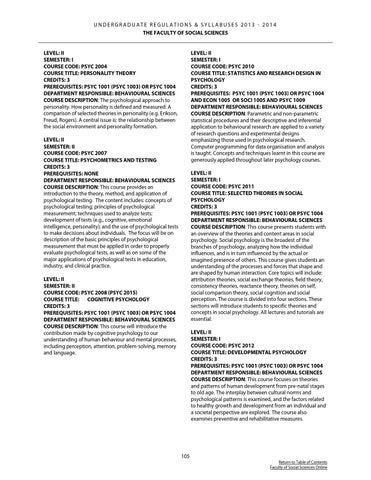UNDERGRADUATE REGULATIONS & SYLLABUSES 2013 - 2014 THE FACULTY OF SOCIAL SCIENCES LEVEL: II SEMESTER: I COURSE CODE: PSYC 2010 COURSE TITLE: STATISTICS AND RESEARCH DESIGN IN PSYCHOLOGY CREDITS: 3 PREREQUISITES: PSYC 1001 (PSYC 1003) OR PSYC 1004 AND ECON 1005 OR SOCI 1005 AND PSYC 1009 DEPARTMENT RESPONSIBLE: BEHAVIOURAL SCIENCES COURSE DESCRIPTION: Parametric and non-parametric statistical procedures and their descriptive and inferential application to behavioural research are applied to a variety of research questions and experimental designs emphasizing those used in psychological research. Computer programming for data organisation and analysis is taught. Concepts and techniques learnt in this course are generously applied throughout later psychology courses.
LEVEL: II SEMESTER: I COURSE CODE: PSYC 2004 COURSE TITLE: PERSONALITY THEORY CREDITS: 3 PREREQUISITES: PSYC 1001 (PSYC 1003) OR PSYC 1004 DEPARTMENT RESPONSIBLE: BEHAVIOURAL SCIENCES COURSE DESCRIPTION: The psychological approach to personality. How personality is defined and measured: A comparison of selected theories in personality (e.g. Erikson, Freud, Rogers). A central issue is: the relationship between the social environment and personality formation. LEVEL: II SEMESTER: II COURSE CODE: PSYC 2007 COURSE TITLE: PSYCHOMETRICS AND TESTING CREDITS: 3 PREREQUISITES: NONE DEPARTMENT RESPONSIBLE: BEHAVIOURAL SCIENCES COURSE DESCRIPTION: This course provides an introduction to the theory, method, and application of psychological testing. The content includes: concepts of psychological testing; principles of psychological measurement; techniques used to analyze tests; development of tests (e.g., cognitive, emotional intelligence, personality); and the use of psychological tests to make decisions about individuals. The focus will be on description of the basic principles of psychological measurement that must be applied in order to properly evaluate psychological tests, as well as on some of the major applications of psychological tests in education, industry, and clinical practice.
LEVEL: II SEMESTER: I COURSE CODE: PSYC 2011 COURSE TITLE: SELECTED THEORIES IN SOCIAL PSYCHOLOGY CREDITS: 3 PREREQUISITES: PSYC 1001 (PSYC 1003) OR PSYC 1004 DEPARTMENT RESPONSIBLE: BEHAVIOURAL SCIENCES COURSE DESCRIPTION: This course presents students with an overview of the theories and content areas in social psychology. Social psychology is the broadest of the branches of psychology, analyzing how the individual influences, and is in turn influenced by the actual or imagined presence of others. This course gives students an understanding of the processes and forces that shape and are shaped by human interaction. Core topics will include: attribution theories, social exchange theories, field theory, consistency theories, reactance theory, theories on self, social comparison theory, social cognition and social perception. The course is divided into four sections. These sections will introduce students to specific theories and concepts in social psychology. All lectures and tutorials are essential.
LEVEL: II SEMESTER: II COURSE CODE: PSYC 2008 (PSYC 2015) COURSE TITLE: COGNITIVE PSYCHOLOGY CREDITS: 3 PREREQUISITES: PSYC 1001 (PSYC 1003) OR PSYC 1004 DEPARTMENT RESPONSIBLE: BEHAVIOURAL SCIENCES COURSE DESCRIPTION: This course will introduce the contribution made by cognitive psychology to our understanding of human behaviour and mental processes, including perception, attention, problem-solving, memory and language.
LEVEL: II SEMESTER: I COURSE CODE: PSYC 2012 COURSE TITLE: DEVELOPMENTAL PSYCHOLOGY CREDITS: 3 PREREQUISITES: PSYC 1001 (PSYC 1003) OR PSYC 1004 DEPARTMENT RESPONSIBLE: BEHAVIOURAL SCIENCES COURSE DESCRIPTION: This course focuses on theories and patterns of human development from pre-natal stages to old age. The interplay between cultural norms and psychological patterns is examined, and the factors related to healthy growth and development from an individual and a societal perspective are explored. The course also examines preventive and rehabilitative measures.
105 Return to Table of Contents Faculty of Social Sciences Online
